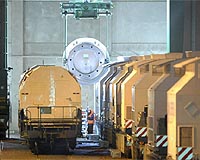 |
Niamey, Niger (UPI) Sep 24, 2010 Suddenly, the uranium mining industry is becoming a risky business, it seems. Islamic militants who kidnapped seven people at a French-owned uranium mine in Niger Sept. 16 have warned Western firms that "steal our wealth to leave promptly." In recent months, the steep rise in the price of uranium oxide, used to fuel nuclear power plants, has attracted Canadian, Australian and Chinese companies to challenge the monopoly in Niger held by France's state-owned nuclear giant, Areva. It remains to be seen whether these companies will be prepared to risk moving into Niger but uranium is much in demand and that's liable to grow as government around the globe shift to nuclear power as oil reserves shrink. Nowhere is the nuclear drive stronger than in the Middle East, where oil has been the engine of economic growth. Al-Qaida of the Islamic Maghreb, which claims to hold the hostages seized in Niger, declared in a statement France shouldn't take military action against it and cast its warning further afield. It said Western firms "that steal our wealth and take advantage of our people should know that they are legitimate targets for the mujaheddin and they should leave promptly because our land is not a field for plunder and our wealth is not something to be taken advantage of." That may be little more than jihadist rhetoric to cover a kidnap-for-ransom enterprise and there is considerable skepticism that AQIM has the resources to conduct such a campaign. But the colonial legacy of France, Britain and Belgium and the backing they have given African dictators in return for access to the continent's wealth is sure to strike a chord among impoverished Africans whose leaders have plundered their countries' natural resources to enrich themselves. France, which started giving up its 16 colonies in north and west Africa in the 1960s, has been a leading proponent of such a policy. For decades, this produced corrupt and brutal, yet stable, African partners for France, helping it fend off the rival influences of Britain, the United States and more recently China. These included President Omar Bongo of resource-rich Gabon, a notorious plunderer who died in June after 41 years in power in what is now the fourth largest oil producer in sub-Saharan Africa. France has often provided military support for these dictators. From 1997 to 2002, France intervened militarily in its former African colonies 34 times -- 26 of them outside the umbrella of the United Nations. In June 2009, African analyst Khadija Sharife, writing in Foreign Policy in Focus, observed: "France drew up secretive defense agreements, which are still active today, that authorized it to legally maintain military bases in the Ivory Coast, Gabon, Togo, Cameroon, Djibouti, the Central African Republic, Senegal and other countries "Clauses contained within the agreements also ensured that France was legally entitled to be informed of and maintain priority access to natural resources, including uranium, oil and gas." Still, French influence has been waning in Africa. But President Nicolas Sarkozy vowed when he was elected three years ago he would restore French influence in the former colonies and French-speaking countries like the Democratic Republic of Congo, once ruled by Belgium. The DRC, fabulously wealthy in natural resources, has been steadily plundered by warring factions over the last two decades. It is the world's largest French-speaking nation and if peace is ever restored would be a vital economic partner for Paris. France's desire to have access to the wealth of the DRC and neighboring Congo-Brazzaville was illustrated by the decision by a French appeals court in October 2009 to halt a judicial investigation into the alleged plundering of their countries' riches by President Denis Sassou-Nguesso of Congo-Brazzaville, Omar Bongo of Gabon and Teodoro Obiang of Equatorial Guinea. The latter is a former Spanish colony but Paris has courted its despotic rulers because the country's a burgeoning oil producer of growing strategic importance. The charges of pillaging these nations with the connivance of successive French governments and using the loot to buy real estate in France were brought against the trio of African tyrants by the anti-corruption group Transparency International. A senior investigating magistrate ruled in May 2009 that there was a case to answer, much to the dismay of Paris. State prosecutors sought to have the investigation stopped, and the appeals court ruled in their favor.
Share This Article With Planet Earth
Related Links Nuclear Power News - Nuclear Science, Nuclear Technology Powering The World in the 21st Century at Energy-Daily.com
 Germany approves disputed nuclear shipment to Russia
Germany approves disputed nuclear shipment to RussiaBerlin (AFP) Sept 23, 2010 German authorities approved Thursday hotly disputed plans to ship radioactive nuclear waste to Russia in a move expected to spark fresh protests by atomic energy opponents in both countries. Germany's nuclear watchdog green-lighted the shipment of 951 spent fuel elements from the temporary storage site Ahaus in the west of the country to the Mayak nuclear facility, 2,000 kilometres (1,200 mi ... read more |
|
| The content herein, unless otherwise known to be public domain, are Copyright 1995-2010 - SpaceDaily. AFP and UPI Wire Stories are copyright Agence France-Presse and United Press International. ESA Portal Reports are copyright European Space Agency. All NASA sourced material is public domain. Additional copyrights may apply in whole or part to other bona fide parties. Advertising does not imply endorsement,agreement or approval of any opinions, statements or information provided by SpaceDaily on any Web page published or hosted by SpaceDaily. Privacy Statement |